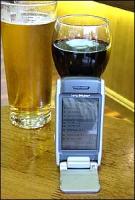







|
News and Information
Chemists escape labs via mobiles
| February 4, 2005 |
 Chemists escape labs via mobiles Chemists escape labs via mobiles
By Jo Twist
BBC News science and technology reporter
The system is not smart enough to actually buy a round yet
A blend of mobile technology and award-winning software is letting scientists finally escape the lab.
The software, called "middleware", lets different computer systems talk to each other securely and instantaneously.
As part of a national e-Science project in the UK, it is being used to let Southampton University chemists monitor experiment conditions from mobiles.
Sensors in the lab pick up any changes in the environment so the system can alert chemists, wherever they are.
"It replaces the traditional notebook with some electronic form, but it is not just about carrying around a computer - it is much smarter than that," Dr Jeremy Frey, from Southampton University, told the BBC New website.
"We wanted to be able to monitor and keep tabs on experiments outside the labs," he explained.
This is crucial because if there is an anomaly in the experiment data, it could be down to a change in temperature, light, or some other external factor.
The technology makes it easier for these to be spotted, flagged up, recorded, and analysed as soon as possible by experts collaborating all over the world.
No messy messaging
Dr Andy Stanford-Clark, IBM's pervasive messaging technologies manager, explained: "It is 'off-the-shelf' so people don't have to worry about what happens.
"It is like a parcel service - you just wrap it up and send it. You don't have to worry about the bits and bytes, ones and zeroes," he said.
Although monitoring experiments away from the lab has always been possible, explained Dr Frey, it is a challenge getting systems to talk to mobiles, for instance.
"The older ways of doing it were very bespoke and programs often had to be rewritten, if a new line of data was added, for instance.
"Now we can put new sensors in, the system can talk to the broker [middleware], publish it, and anyone can subscribe to it, taking the information they want."
If a particular element in or around the experiment changes above a certain level, it will let the scientists know immediately.
"It is better to be away from an experiment, but you always want to monitor them - you never know when things may go wrong," said Dr Frey.
The team's laser experiment, behind locked doors, is looking at the behaviour of molecules at the surface of oil and water and the conditions have to be strictly controlled.
It is better to be away from an experiment, but you always want to monitor them - you never know when things may go wrong
Dr Jeremy Frey, Soton
Sensors positioned around the lab monitor the environment and feed data into a computer.
The system can also detect when a person has entered the secure lab, which can be dangerous or disruptive to the individual and the science itself.
Data can be accessed from any GPRS or wi-fi smartphone or personal digital assistant that uses internet protocol, without having to build any other application that will let the systems translate and talk to each other.
That means it works whatever kind of operating system that the device runs on.
On the device is a prototype program for scientists to be able to read the data.
It has been specially developed for the project to be a light application, so that it requires little bandwidth.
"Pervasive computing in the last five or six years, with smartphones and PDAs and small sensors which people want to gather data from, and send to, really has come onto our radars," said Dr Stanford-Clark.
With the speed of experimental processes accelerating, it is crucial, added Dr Frey, for people to have access to data immediately and to trace back all that was done in an experiment in more detail.
PDAs everywhere
Members of Dr Frey's non-linear laser spectroscopy research group, working as part of the Combechem project, have been successfully trying out the system at conferences - and in the university bar.
The next step is to evolve the system so that at a push of a button on a mobile, scientists will be able to remotely change the conditions in the lab, like turning down the temperature.
It could also realise the promise of controlling home environments from phones easily and seamlessly.
Chemists enjoy a drink at the bar while keeping and eye on the lab
But there are many other potential applications for the monitoring jobs done by the power industries, healthcare professions and other labs.
IBM won the Royal Academy of Engineering's MacRobert prize which rewards technological and engineering innovation for the program in June last year.
Used by top global banks, the WebSphere MQ family is a decade old.
It has transformed e-commerce because of its ability to allow data transfers across computer systems and different platforms without extra coding.
Combechem is a UK e-Science project funded by the Engineering and Physical Sciences Research Council (EPSRC).
The project is working on grid-enabled combinatorial chemistry. A bit part of the project is to develop an e-Lab, using pervasive computing technology. |
Source: www.bbc.com |
| http://www.caprivifreedom.com/admin/news.i?cmd=addform |
|
| Support Caprivi Freedom |
Fill out the form below to become a member of this site and receive our regular newsletter.
|

|

